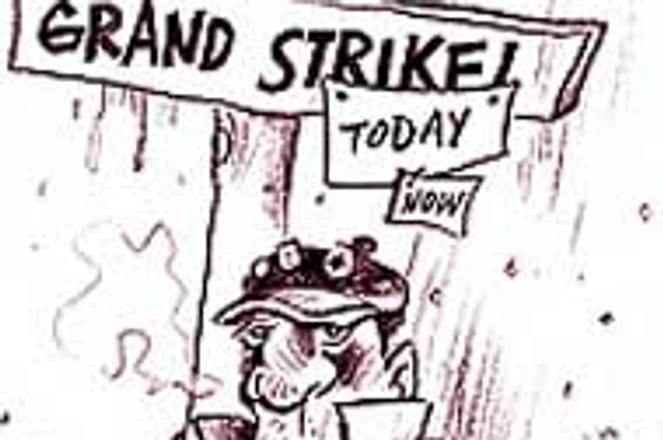illustration: Igor Lyskov
Slovakia this week entered a state of 'strike alert,' called for the first time ever by the country's largest trade union umbrella group, the Confederation of Trade Unions (KOZ). What this means isn't exactly clear - KOZ President Ivan Saktor has said the Conderation will carry out an information campaign to acquiant the public with the plight of workers, and will form strike committees among its member unions. Other unionists, however, have talked of putting the country on a footing for a general strike.
If the KOZ's 'strike alert' is indeed the prelude to a general strike, it would be a piece of irresponsible folly on the part of the KOZ. Slovaks saw general strikes in 1920, 1949, 1968 and 1989 - all years of momentous change. But 1999 is not 1989, and the country at this point does not need the kind of social and political upheaval that general strikes produce.
So why is the KOZ employing such aggressive tactics? Besides hypocrisy, opportunism and short-sightedness, the reason would seem to be to shore up membership levels, suggesting that the union's leaders do not have the best interests of workers in mind.
The KOZ has had far less to beef about under the Dzurinda government than it did under the previous administration. In 1997, the KOZ left a bargaining mechanism that included labour, employers and government (known as the 'Tripartite Agreement') after the Mečiar government unilaterally imposed wage controls.
Under Mečiar, however, rather than call strike alerts, the Saktor-led KOZ did little more than sulk. During the run-up to the 1998 elections, the KOZ prepared leaflets for its supporters showing how members of parliament had voted during the 1994-98 period on labour issues, but did not openly support either the opposition or the government.
Under the Dzurinda cabinet, the Tripartite Agreement has been restored, and offers Slovak labour a much larger voice in the formulation of economic policy than it would enjoy in a western democracy - and the result has been mass rallies and talk of a general strike.
The key to this riddle lies in the KOZ's falling membership, which has declined from 2.4 million in 1990 to around 800,000 today. When the Dzurinda government took power, the KOZ expected to see quick action on its demands in accordance with the pre-election promises of the victorious parties. To the unions' dismay, this quick action took the form of two economic austerity packages passed without KOZ approval. In order to save face among its members, the KOZ reacted by criticizing the government more harshly than it ever dared the Mečiar cabinet, and rattling the sabre regarding strikes and civil disobedience.
Under the Slovak Constitution, citizens of this country have the right to strike; under the 1991 Collective Bargaining Law, however, unions cannot call a strike at a company until they have passed through three rounds of collective bargaining with management. A list of names of the people intending to strike must also be published before the action occurs.
These institutional barriers to strike actions on economic (wage and job-related) issues mean that if a general strike is called, it will be political rather than economic in nature. This is dangerous - in strikes about wages or job conditions, the stakes are high, and workers are forced to examine the risks and advantages of their strategy. But in political strikes, people dissatisfied with anything from their pension cheque to the price of fuel can take to the streets without possible consequence.
If Saktor calls a general strike, he will be channelling pent-up anger at falling living standards into a political protest, and given the readiness of the opposition HZDS party to add fuel to the flames, not even Saktor may be able to predict the outcome.


